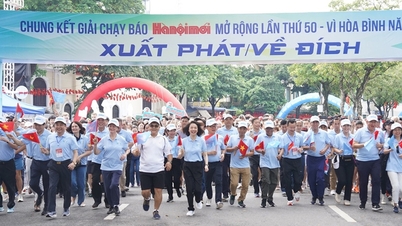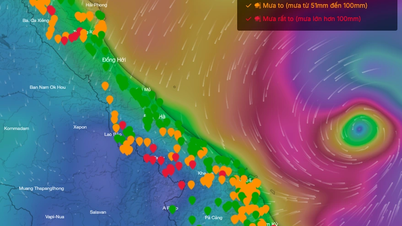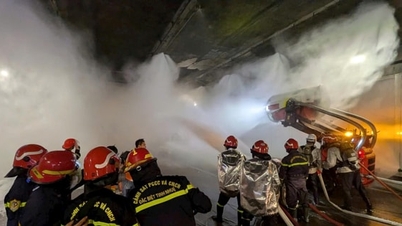The Politburo has just issued Regulation No. 366-QD/TW regulating the review, assessment and classification of quality for collectives and individuals in the political system.
Regulation 366 replaces Regulation No. 124-QD/TW, dated October 4, 2023 of the Politburo on this content.

Standing member of the Secretariat Tran Cam Tu, on behalf of the Politburo, signed and issued Regulation 366 on reviewing, evaluating and classifying the quality of collectives and individuals in the political system.
PHOTO: GIA HAN
Compared with Regulation 124, Regulation 366 has expanded the scope of regulations on quality review, assessment and classification by term, annually, quarterly or when necessary, not stopping at the "annual" mark as before.
At the same time, regarding the purpose of assessment, Regulation 366 also adds the purpose of screening, replacing, disciplining, temporarily suspending work, removing from office, resigning, and dismissing officials who have degraded, have limited capacity, and do not complete their tasks.
Regarding assessment requirements and principles, Regulation 366 emphasizes that assessment must be based on work efficiency, task performance results, and specific products associated with job positions and responsibilities according to quantity, progress, and quality.
At the same time, Regulation 366 of the Politburo requires assessment to be carried out in a consistent, continuous, multi-dimensional manner, with criteria and through specific products; combining qualitative and quantitative criteria, with special attention paid to quantitative criteria on results and effectiveness of task implementation.
Notably, Regulation 366 of the Politburo requires that quality assessment of collectives and individuals be carried out according to a common criteria framework, including groups of criteria with quantified results on a 100-point scale. These results are the basis for quality classification after review and assessment.
Specifically, along with Regulation 366, the Politburo issued 5 appendices detailing the framework of assessment criteria on a 100-point scale for each group of subjects, including: collectives; leaders and managers under the Central management; leaders and managers at all levels; individuals not holding positions and party members not working in the political system.
In which, the evaluation criteria framework is divided into 2 groups: general criteria group (30 points) and criteria group on task performance results (70 points). For individuals, the general criteria group stipulates criteria on political qualities, ethics, lifestyle, exemplary performance of responsibilities; innovative thinking, strategy of aspiration to contribute, daring to think, daring to do; self-criticism and criticism, self-reflection, self-correction, overcoming limitations and shortcomings.
The criteria group on task performance results and leadership and management capacity will be specified for each task according to the positions.
Changes in assessment and classification of cadres and party members
Regarding quality classification criteria, instead of classification based on qualitative conditions as in Regulation 124, Regulation 366 also stipulates 4 classification levels but is associated with a specific scale and clear quantitative conditions.
Specifically, the level of excellent task completion must reach a score of 90 points or higher. At the same time, 100% of tasks must be completed, of which at least 30% of the tasks must be completed beyond the set level (for both individuals and groups).
The new regulation still applies the regulation that the number of collectives and individuals classified as "Excellently completing tasks" does not exceed 20% of the total number of collectives and individuals classified as "Goodly completing tasks". However, it can be increased to no more than 25% for cases with outstanding achievements.
Regarding the level of completing tasks well, must achieve from 70 - under 90 points; at the same time complete 100% of tasks on time, ensuring quality.
The task completion level is from 50 to under 70 points; at the same time, 100% of the tasks are completed, the number of tasks that have not met the progress requirements does not exceed 20%.
The level of failure to complete the task is collective, individual has a score below 50 points or falls into one of the specific cases.
Regulation 366 adds many new specific cases. For example, for a collective, if a member commits a violation related to public service and is disciplined from reprimand or higher; if a member has degraded; or if the locality or unit under his/her leadership completes less than 70% of its tasks or fails to complete 5 basic socio -economic targets (economic growth, budget revenue, public investment disbursement, average income, poverty reduction).
For individual leaders and managers, they will be classified as having not completed their tasks if their assigned field completes less than 70% of its tasks or fails to complete 5 basic socio-economic targets; has more than 50% of low confidence votes; has violations related to public service and is disciplined from reprimand or higher; has organizations and individuals under their management who are involved in corruption or negativity and are subject to disciplinary action.
For individuals who do not hold a position, they will be assessed as not completing their tasks if more than 50% of their tasks in the year are assessed as not completing...
See full text of Regulation 366-QD/TW below:
Source: https://thanhnien.vn/bo-chinh-tri-ban-hanh-tieu-chi-danh-gia-can-bo-dang-vien-theo-thang-diem-100-185250920111919699.htm



![[Photo] National Assembly Chairman Tran Thanh Man attends the inauguration ceremony of the Memorial Site of National Assembly Standing Committee Chairman Bui Bang Doan](https://vphoto.vietnam.vn/thumb/1200x675/vietnam/resource/IMAGE/2025/9/28/6feba23492d14b03b05445dd9f1dba88)


































































































Comment (0)